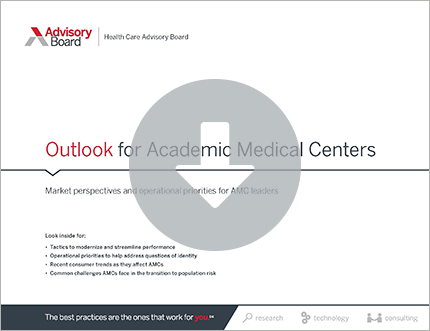Auto logout in seconds.
Continue LogoutDespite some experts' calls to divert patients away from expensive academic medical centers (AMCs), research demonstrates that AMCs may produce better patients outcomes—and may not cost as much as some policymakers fear, a trio of prominent health care experts write in a JAMA viewpoint published Monday.
Why AMCs may provide costlier care
In the viewpoint, Dhruv Khullar, a physician at NewYork-Presbyterian Hospital and an assistant professor in the Weill Cornell Department of Healthcare Policy and Research, health care economist Austin Frakt, and Laura Burke, an assistant professor of emergency medicine at Harvard Medical School, examine existing data to see if common perceptions about AMCs hold true.
The authors note that academic medical centers are generally equipped with sophisticated technology and a high level of subspecialty expertise, enabling them to train the next generation of physicians. But AMCs are known for being more expensive than community hospitals, leading some health care payers and policymakers to question whether the care provided at AMCs is worth the price tag.
Do AMCs offer better care?
According to the researchers, a few recent studies show that AMCs generally have lower mortality rates than nonteaching hospitals. One study that evaluated more than 21 million Medicare fee-for-service hospitalizations found that patients treated at major teaching hospitals had a lower 30-day mortality than patients treated at nonteaching hospitals.
The study also found that teaching hospitals had lower mortality rates for 11 out of 15 common medical conditions and two out of six common surgical conditions.
"[T]his work suggested that AMCs have significant mortality benefits for Medicare patients across a variety of conditions," the authors write.
Some policymakers have suggested, however, that these advantages are valuable only to patients with complex conditions—arguing, the authors write, "that healthier patients should not be cared for at AMCs because they are not likely to require the (relatively expensive) resources at these centers."
But evidence suggests that even low-severity patients may see improvement in mortality rates at AMCs. "Why nonsurgical patients with low absolute mortality rates still benefit … is unclear," the authors write, adding that possible explanations include availability of care management resources, better performance on process measures, and lower rate of diagnostic error.
What about cost?
While some experts take for granted that AMCs are more expensive, the reality is more "complicated," the authors write. "Much of the research examining costs, particularly for Medicare, is decades old and has yielded mixed results," they note.
One study that examined the costs of care for 1 million Medicare hospitalizations at AMCs and nonteaching hospitals found that AMCs had slightly higher costs during index hospitalization than nonteaching hospitals. However, the study also found that at 30 days, the AMCs had lower overall costs compared to nonteaching hospitals, largely due to lower spending on readmissions and post-acute care.
"The reasons for these differences are not clear, but it is possible that greater intensity of care during the index hospitalization at an AMC reduces the need for follow-up care, or that AMCs are able to provide more integrated post-acute care," the authors write.
But the study found a further wrinkle: When researchers examined costs at 90 days, they found no differences between costs at AMCs and nonteaching hospitals, "suggesting that whatever factors accounted for lower AMC costs at 30 days may not persist," the authors write.
Further, "the relatively lower cost of AMCs does not persist when including the indirect medical education payments that Medicare makes to teaching hospitals to train residents and fellows," the authors note.
Should policymakers divert care from AMCs?
Based on all of this research, "[e]fforts to divert care away from AMCs … may be misguided," the authors write. But they emphasize that the research remains unclear on several points.
For instance, they note that the differences in health outcomes are worth further analysis, costs should continue to be monitored as "more expensive therapies are developed."
"Ultimately," they write, "the debate about whether to direct patients to one type of institution over another should be informed by research and by a clear appreciation of the tradeoffs being made. Without that commitment, there is the risk of allowing opinion and interests, rather than data and evidence, to determine where, when, and how patients receive care" (Khullar et.al, JAMA, 6/17).
10 market perspectives and operational priorities for AMC leaders
Learn why academic medical centers must transform their business model, how operational improvements can set the stage for strategic reinvention of the AMC identity, and what "systemness" means in the AMC context.
Don't miss out on the latest Advisory Board insights
Create your free account to access 1 resource, including the latest research and webinars.
Want access without creating an account?
You have 1 free members-only resource remaining this month.
1 free members-only resources remaining
1 free members-only resources remaining
You've reached your limit of free insights
Become a member to access all of Advisory Board's resources, events, and experts
Never miss out on the latest innovative health care content tailored to you.
Benefits include:
You've reached your limit of free insights
Become a member to access all of Advisory Board's resources, events, and experts
Never miss out on the latest innovative health care content tailored to you.
Benefits include:
This content is available through your Curated Research partnership with Advisory Board. Click on ‘view this resource’ to read the full piece
Email ask@advisory.com to learn more
Click on ‘Become a Member’ to learn about the benefits of a Full-Access partnership with Advisory Board
Never miss out on the latest innovative health care content tailored to you.
Benefits Include:
This is for members only. Learn more.
Click on ‘Become a Member’ to learn about the benefits of a Full-Access partnership with Advisory Board
Never miss out on the latest innovative health care content tailored to you.



